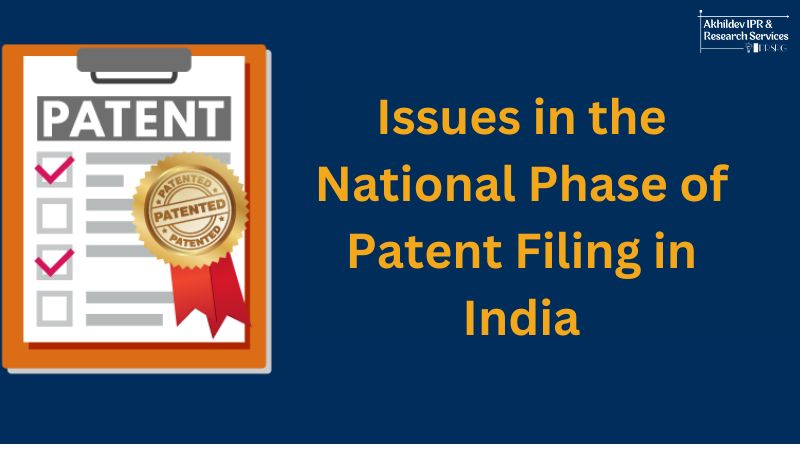
Patent is territorial right. It means one who is seeking the monopoly in terms of using his or her in invention need to file in all those specific countries where he or she is seeking the monopoly rights. It is in this context national phase of patent filing becomes significant. For example, the inventor/applicant who has asked the patent office of his or her own country let us assume it be USA for the patent right and now wish to file for same monopoly rights in India. In that case the concerned person should approach to patent office of India. It is advisable to approach patent office of India through Indian Registered patent agent or an Indian IPR firm who due to their technical awareness of the law can suggest aptly. Akhildev IPR and Research Services is one such law firm with 10 years of experience in Indian IPR domain. They look into all the aspect of IPR like that Patent, Trademark Industrial design, Copyright. They serve in filing, prosecution and litigation of all forms of IPR. The national phase is the subsequent stage where the applicant enters individual countries to pursue patent protection. Each country has its own specific requirements, procedures, and timelines for granting patents. The national phase of patent filing, following the international Patent Cooperation Treaty (PCT) application, presents several challenges for inventors and patent attorneys. This article delves into some of the common issues encountered during this critical stage.
Time Constraints and Deadlines
One of the most significant challenges in National Phase of Patent Filing is adhering to strict deadlines. The transition from the international phase to the national phase requires careful planning and timely execution. Missing deadlines can lead to the loss of patent rights in specific jurisdictions.
Translation and Formalization Requirements
Converting the PCT application into the required language and format for each National Phase of Patent Filing can be time-consuming and costly. Ensuring accuracy in translation and adherence to local patent office formalities is crucial to avoid delays and rejections.
Examination Process Variations
Patent offices worldwide have different examination procedures, standards, and requirements. Navigating these differences can be complex, especially for applicants with multiple national phase entries. Understanding the specific requirements of each jurisdiction is essential to increase the chances of patent grant.
Cost Implications
The National Phase of Patent Filing involves substantial fees for filing, search, examination, and translation. Managing costs effectively while ensuring comprehensive protection is a significant challenge for many applicants.
Prior Art Search and Analysis
While the PCT application includes an international search report, additional prior art search and analysis may be necessary for the National Phase of Patent Filing. Identifying relevant prior art and addressing potential objections is crucial for obtaining a patent.
Claim Amendments
Adapting claims to comply with national patent laws and addressing examiner objections often requires careful consideration and strategic decision-making. Balancing the need for claim breadth with patentability requirements is a delicate process.
Patent Prosecution and Appeals
Interacting with different patent offices, understanding their procedures, and effectively responding to office actions can be time-consuming and complex. In case of rejections, appealing the decisions can be a lengthy and costly process. By understanding these challenges and implementing effective strategies, applicants can increase their chances of successfully navigating the National Phase of Patent Filing and securing patent protection in desired jurisdictions. At the same time, it is also important to partner with such a law firm who are proactive and well versed with patent law at the same time has the proven record of getting the patent granted. Moreover, the IPR firm which has the litigation team intact with the filing team can further be more valuable. It is because the same team has worked from the beginning and understand the invention better.
